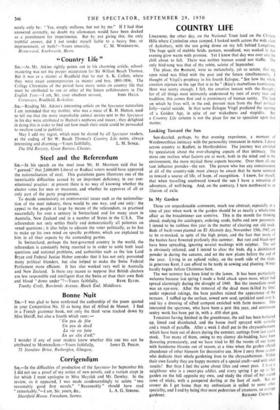Steel and the Referendum
SIR,—In his speech on the steel issue Mr. H. Morrison said that he " guessed:' that 2,600,000 Liberal or Radical voters would have approved the nationalisation of steel. This gratuitous guess illustrates one of the inextricable difficulties caused by an important deficiency in our con- stitutional practice: at present there is no way of knowing whether the elector votes for men or measures, and whether he approves of all or only part of the party programmes.
To decide conclusively on controversial issues such as the nationalisa- tion of the steel industry, there would be one way, and one only: the appeal to the people at large by means of the referendum, as practised successfully for over a century in Switzerland and for many years in Australia, New Zealand and in a number of States in the U.S.A. The referendum not only settles finally and democratically all polemics on vexed questions ; it also helps to educate the voter politically, as he has to make up his own mind on specific problems, which are explained to him in all their aspects by the contending parties.
In Switzerland, perhaps the best-governed country in the world, the referendum is constantly being resorted to in order to settle both local questions and national problems, and authorities such as the late Lord Bryce and Federal Justice Huber consider that it has not only prevented many political blunders, but also helped to make the Swiss Federal Parliament more efficient. It has also worked very well in Australia and New Zealand. Is there any reason to suppose that British electors are less responsible and intelligent than the Swiss or than their own flesh


























 Previous page
Previous page